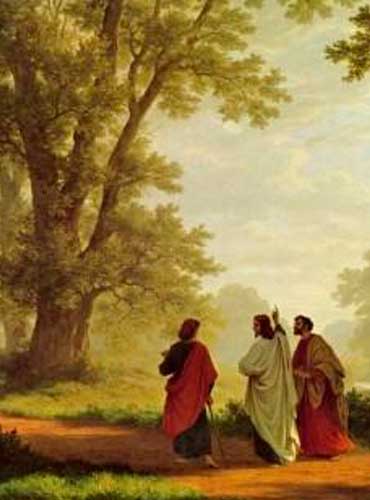Wednesday of the Octave of Easter – Lk 24:13-35
As we make our way through the Easter Octave, the Gospels recount for us the various apparitions of our Resurrected Lord. This apparition to the disciples on the road to Emmaus, which Saint Ignatius of Loyola labels as the fifth apparition, can serve us as a beautiful example for applying joy of Easter to every moment of our lives.
First, we can notice the attitude of the disciples. They “had hoped”; indeed, the expression is emphatic in the Greek, “We, the disciples, were hoping . . .”[1] It was a personal sense of disappointment, pain, sadness, and loss, so much so that even the events recounted by the women are suspect.
Yet, Christ doesn’t leave His disciples alone. He draws near to them and walks with them; He becomes their companion. The word companion itself derives from the Latin cum, meaning “with or together,” and panis, “bread”; literally, then, a companion is someone who shares the bread, to “share something of vital nature like ‘the bread of the journey,’ that is, share one’s own faith, the experience of . . . God’s love, hope, difficulties,” and the like.[2] As He draws near to His disciples, He explains things to them, sharing their burden and His infinite loving wisdom, and their hearts are inflamed with love of Him.
This experience is mirrored in our own lives. Speaking to young people in 1997, Pope Saint John Paul II said: “Christ constantly repeats this journey to Emmaus. . . . He also wants to walk it again with you. . . . When you perform your daily tasks, in study or work, when you serve your brothers and sisters, when you share your doubts and hopes, when you reflect on Scripture, alone or in church, when you take part in the Eucharist, Christ joins you; He walks beside you; He is your strength, your nourishment and your light. . . . Do not be afraid to let Christ join you like the disciples of Emmaus.”[3]
The disciples are so transformed that they don’t want Jesus to leave. “When the disciples on the way to Emmaus asked Jesus to stay ‘with’ them, [however], He responded by giving them a much greater gift: through the Sacrament of the Eucharist He found a way to stay ‘in’ them.”[4] He truly become their companion, breaking the bread of His very body with them. Is it any wonder then that Saint Madeline Sophie Barat called the Eucharist, “paradise on earth,” since that is where Jesus is?
Lastly, the disciples are so moved by Christ’s presence and so inflamed with His love that they return to Jerusalem, making that long journey in the dark, but illuminated by the light of faith. It is that love from the encounter with Christ that impels them, as Saint Paul would say, to share the Good News with others. When we truly allow Christ to accompany us, especially in the difficult moments, we are able to share His presence with others. The joy of Easter is no longer just ours, but rather a gift to be shared.
As we celebrate Mass throughout this octave, let us remind ourselves that the Resurrected Christ becomes present at every consecration, becoming our companion here and now, to help us in our sorrows and our difficulties, and to bring us that limitless joy. Do we allow Christ to accompany us at every moment, even the difficult ones?
Let us ask, through the intercession of Mary, Cause of Our Joy, for the grace “to be glad and rejoice intensely because of the great joy and the glory of Christ our Lord.”
[1] ἡμεῖς δὲ ἠλπίζομεν – The ἡμεῖς isn’t needed and is thus emphatic.
[2] Ratio Formationis of the Servants of Charity, Rome 2006; n. 49.
[3] Homily of John Paul during the Meeting with the Young People of Lebanon: 10 May 1997
[4] Aposotolic Letter Mane Nobiscum Domine, 19.






